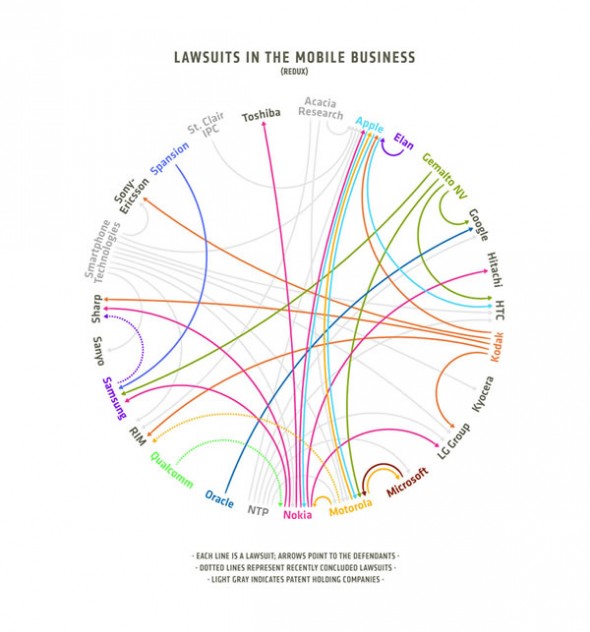 Although it was pretty clear that Google needed to add some clout to its mobile patent portfolio if it wanted to be able to protect Android and its partners from the constant legal onslaught from Apple and Microsoft, the agreement to acquire the whole of Motorola Mobility not simply their patent portfolio caught a number of people off-guard.
Although it was pretty clear that Google needed to add some clout to its mobile patent portfolio if it wanted to be able to protect Android and its partners from the constant legal onslaught from Apple and Microsoft, the agreement to acquire the whole of Motorola Mobility not simply their patent portfolio caught a number of people off-guard.
The following disgram shows the various lawsuits in the mobile technology industry, but the nature of this map is likely to change once the Google-Motorola deal goes through.

The Android Ecosystem
Within the Android camp, the statements have been pretty positive with J.K. Shin, President, Samsung, Mobile Communications Division making the quote below and similar sentiments coming from HTC, Sony Ericsson, LG and others.
We welcome today’s news, which demonstrates Google’s deep commitment to defending Android, its partners, and the ecosystem.
On the one hand, these pleasantries a well-founded as Google has committed to keep the Android platform open and free – and Motorola’s significant haul of mobile patents will enable Google to protect its Android partners using that old tactic of mutually assured destruction with Apple and Microsoft. However, alongside those sentiments, other manufacturers in the “Android ecosystem” must be concerned that Motorola phones will be getting some Google in-house features that will make them standout from the Android crowd. You can be sure that they will be looking into their agreements with Microsoft over using Windows Phone 7 on their devices as they will look to diversify outside of Android which whilst open for now, may not always be the case.
Microsoft
There are rumours today that Microsoft was also bidding on Motorola Mobility, and would have gone up to $7.6 Billion for the company and its patent portfolio. If it had been successful, Microsoft would likely have used the patents to further put pressure on Android – meaning more companies would have been pushed into signing a “licensing agreement” along the lines of the $5/phone that HTC pays to the Redmond-based corporation to protect itself from litigation.
Beyond the patents, Microsoft could have made use of Motorola’s manufacturing abilities to push a new wave of Zune-styled phones that could compete directly with Apple. However, the company would likely have realized that any plans they had for widespread use of Windows Phone OS would have disappeared the moment they started producing a series of Microsoft-Motorola devices. Whether they would be better off selling a full hardware-software ecosystem a la Apple, or just the software as they successfully have done on PCs for decades would be up for debate, but I would imagine the software-only route would eventually win out. Software is what Microsoft is good at – excluding the Xbox Microsoft hardware has not been massively successful.
Without Motorola, Microsoft may be looking towards other technology firms in their bid to compete with both Apple and the new Google-Motorola juggernaut. They have already put $1 Billion into their deal with Nokia which is just about to start bearing fruit – which could make them a target for acquisition, but others such as HTC could also be prospects with a cash-ready Microsoft looking at ventures. If Microsoft can’t push Android manufacturers around with patent litigation any more, Microsoft will be actively looking for new ways to control and influence the mobile market as it tries to get a foot-hold with Windows Phone 7.
Apple
Apple, even more so than Microsoft, has been leading a charge of patent litigation against the Android ecosystem – hoping to prevent goods hitting the market and to force manufacturers who do get to market to pay up for litigation protection. With Google having Motorola’s hefty patent portfolio of over 17,000 patents to fight against will mean that Apple will no longer be able to play the patent bully.
Apple did not have any designs on acquiring Motorola, but they would have likely looked into the possibility of purchasing the patent portfolio in a similar fashion to Microsoft. Indeed, with those patents on hand Apple could well have forced a number of Android manufacturers into some lucrative license agreements – something which they now will not be able to do.
Conclusions
Both Microsoft and Apple have tried to force the market in their favour by waving patent litigation at their competitors that have been making good use of the free and open source Android platform. Suddenly, however, that tactic seems less likely to produce results for them, even after the fiasco surrounding the Nortel patents recently.
The two major patent portfolios that are still available are from Nokia and InterDigital, with it unlikely that RIM would be ready to sell at this point. However, with Apple, Microsoft, and now Google all having major patent portfolios at their fingertips for legal battle – their usefulness may be being overstated by some.
All of this is good news for the consumer though, as with all three competitors on similar legal footing, the way to gain market share will again fall to innovation – something which has been decidedly lacking from Apple over the past 12 months.
[Lawsuit Diagram by George Kokkinidis at Design Language News]


Pingback: Will Samsung or HTC Buy HPs PC Business? | TechFruit